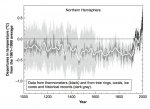Not that I disagree with you, but I'd rather have climate skeptics explain to me what they need to be convinced rather than ask them somethings most of them won't be able to give us.
I think asking them what they need might lead to them question their biases.
In some cases this can work. But, there are some very common issues with the approach, based in the fact that we are not nearly so rational as we like to pretend.
Belief, or lack thereof, is often not based on a rational process. We frequently come to a state of beliefs for reasons other than factual evidence, and having come to a belief, we put an emotional stake in the ground regarding it, that we are often not really aware of. So, when you ask that question, they will come up with a rational or rationalized answer. You may meet the requirements of that answer... and they still don't believe you. While they said X was required, X actually didn't convince them.
Now, you have *two* issues
1) You *said* X would to it, and it didn't - a commitment was made, but failed to resolve. This brings in a bunch of issues of ego, and will tend to the person moving the goalposts, or otherwise digging in, and blaming you, or your data, or just about anything other than themselves for the breach of agreement. While occasionally in the real world you can manage this, and even *use* it (my wife has some great techniques for using this to eventually make a breakthrough with people), but on the internet it just becomes argument, and nobody gets anywhere.
2) You still haven't convinced them. (1) has probably led them to dig their emotional stake in even deeper, so you've actually made reverse progress.
In another post, a little later this afternoon, I would like to try to elucidate some of the common emotional stakes involved in this particular discussion.





